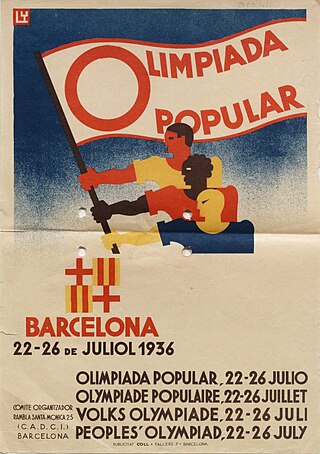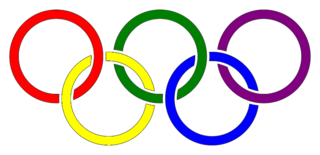Related Research Articles

An amateur is generally considered a person who pursues an avocation independent from their source of income. Amateurs and their pursuits are also described as popular, informal, self-taught, user-generated, DIY, and hobbyist.

The modern Olympic Games are the world's leading international sporting events. They feature summer and winter sports competitions in which thousands of athletes from around the world participate in a variety of competitions. The Olympic Games are considered the world's foremost sports competition, with more than 200 teams, representing sovereign states and territories, participating. By default, the Games generally substitute for any world championships during the year in which they take place. The Olympic Games are held every four years. Since 1994, they have alternated between the Summer and Winter Olympics every two years during the four-year Olympiad.

The Summer Olympic Games, also known as the Games of the Olympiad, is a major international multi-sport event normally held once every four years. The inaugural Games took place in 1896 in Athens, Greece, and the most recent was held in 2024 in Paris, France. This was the first international multi-sport event of its kind, organized by the International Olympic Committee (IOC) founded by Pierre de Coubertin. The tradition of awarding medals began in 1904; in each Olympic event, gold medals are awarded for first place, silver medals for second place, and bronze medals for third place. The Winter Olympic Games were created out of the success of the Summer Olympic Games, which are regarded as the largest and most prestigious multi-sport international event in the world.

The 1936 Summer Olympics, officially the Games of the XI Olympiad and officially branded as Berlin 1936, was an international multi-sport event held from 1 to 16 August 1936 in Berlin, Germany. Berlin won the bid to host the Games over Barcelona at the 29th IOC Session on 26 April 1931. The 1936 Games marked the second and most recent time the International Olympic Committee gathered to vote in a city that was bidding to host those Games. Later rule modifications forbade cities hosting the bid vote from being awarded the games.

Hayley Wickenheiser is a Canadian former ice hockey player, resident physician and assistant general manager for the Toronto Maple Leafs. She was the first woman to play full-time professional men’s hockey in a position other than goalie. Wickenheiser was a member of Canada women's national ice hockey team for 23 years, from 1994 until announcing her retirement on January 13, 2017, and is the team's career points leader with 168 goals and 211 assists in 276 games. She represented Canada at the Winter Olympics five times, capturing four gold and one silver medal and twice being named tournament MVP, and one time at the Summer Olympics in softball, and is a seven-time winner of the world championships. She is tied with teammates Caroline Ouellette and Jayna Hefford for the record for the most gold medals of any Canadian Olympian, and is widely considered to be the greatest female ice hockey player of all time. On February 20, 2014, Wickenheiser was elected to the International Olympic Committee's Athletes' Commission. In 2019, she was named to the Hockey Hall of Fame, in her first year of eligibility. She was also inducted into the IIHF Hall of Fame in 2019, and Canada's Sports Hall of Fame in 2022.

James Cleveland "Jesse" Owens was an American track and field athlete who won four gold medals at the 1936 Olympic Games.

The Northern Star Award, formerly known as the Lou Marsh Trophy, the Lou Marsh Memorial Trophy and Lou Marsh Award, is a trophy awarded annually to Canada's top athlete, professional or amateur. It is awarded by a panel of journalists, with the vote taking place in December. It was first awarded in 1936, named in honour of Lou Marsh, a prominent Canadian athlete, referee, and former sports editor of the Toronto Star. The trophy is made of black marble and stands around 75 centimetres high. The words "With Pick and Shovel" appear above the engraved names of the winners. The voting panel consists of sports media voters from across the country including representatives from the Toronto Star, The Canadian Press, FAN590, The Globe and Mail, CBC, Rogers Sportsnet, CTV/TSN, La Presse and the National Post.

Benjamin Sinclair Johnson, is a Canadian former sprinter. During the 1987–88 season he held the title of the world's fastest man, breaking both the 100m and the 60m indoor World Records. He won the 100 metres at the 1987 World Championships in Athletics; and at the 1988 Summer Olympics, but was disqualified for doping and stripped of the gold medals.

Henri de Baillet-Latour, Count of Baillet-Latour was a Belgian aristocrat and the third president of the International Olympic Committee (IOC).

Fanny "Bobbie" Rosenfeld was a Canadian athlete, who won a gold medal for the 100-metre relay and a silver medal for the 100-metre at the 1928 Summer Olympics in Amsterdam. She was a star at basketball, hockey, softball, and tennis; and was called Bobbie for her "bobbed" haircut. In 1949, named Rosenfeld the "Canadian woman athlete of the half-century." The Bobbie Rosenfeld Award is named in her honour. In 1996, she was inducted into the Ontario Sports Hall of Fame.

The People's Olympiad was a planned international multi-sport event that was intended to take place in 1936 in Barcelona, Catalonia within the Spanish Republic. It was conceived as a protest event against the 1936 Summer Olympics being held in Berlin, which was then under control of the Nazi Party.
Mark Roger Tewksbury, is a Canadian former competitive swimmer. He is best known for winning the gold medal in the 100-metre backstroke at the 1992 Summer Olympics. He also hosted the first season of How It's Made, a Canadian documentary series, in 2001.

The 1936 Summer Olympics, officially known as the Games of the XI Olympiad, was an international multi-sport event held in Berlin, Germany, from 1 August to 16 August.

The Canadian Olympic Committee is a private nonprofit organization that represents Canada at the International Olympic Committee. It is also a member of the Pan American Sports Organization.

Charles Joseph Sylvanus Apps, was a Canadian professional ice hockey player for the Toronto Maple Leafs from 1936 to 1948, an Olympic pole vaulter and a Conservative Member of Provincial Parliament in Ontario. In 2017 Apps was named one of the '100 Greatest NHL Players' in history.

Helene Julie Mayer was a German-born fencer who won the gold medal at the 1928 Olympics in Amsterdam, and the silver medal at the 1936 Olympics in Berlin. She competed for Nazi Germany in Berlin, despite having been forced to leave Germany in 1935 and resettle in the United States because she was of Jewish descent. She studied at American universities, and later returned to Germany in 1952 where she died of breast cancer.

Miklós Sárkány was a Hungarian water polo player and Olympic gold medalist.

Athletes and artists who identify as lesbian, gay, bisexual, transgender, pansexual, non-binary, queer, and/or intersex, and/or who have openly been in a same-sex relationship (LGBTQI+) have competed in the Olympic and Paralympic Games, either openly, or having come out some time afterward.

The rate of participation of women in the Olympic Games has been increasing since their first participation in 1900. Some sports are uniquely for women, others are contested by both sexes, while some older sports remain for men only. Studies of media coverage of the Olympics consistently show differences in the ways in which women and men are described and the ways in which their performances are discussed. The representation of women on the International Olympic Committee has historically run well behind the rate of female participation, and long missed its target of a 20% minimum presence of women on their committee. As of 2023, 41.1% of members are women. At the 2024 Paris Olympics, the Games were notable for being the first to achieve gender parity in terms of participation. Of the 10,500 athletes competing, 5,250 were men and 5,250 were women.
References
- ↑ Richard Menkis; Harold Troper (2015). "More than Just Games: Canada and the 1936 Olympics". University of Toronto Press. ISBN 978-1-4426-2690-4. Archived from the original on 2018-10-16. Retrieved 2018-10-15.
- ↑ Jack Lipinsky (2011). "Imposing Their Will: An Organizational History of Jewish Toronto, 1933-1948". McGill-Queen's Press. ISBN 978-0-7735-3845-0. Archived from the original on 2018-10-16. Retrieved 2018-10-15.
- ↑ Bruce Kidd (2017). "'Critical Support' for Sport". Routledge. ISBN 978-1-351-57049-7. Archived from the original on 2018-10-16. Retrieved 2018-10-15.
- ↑ Ralph C. Wilcox; David L. Andrews; Robert Pitter; Richard L. Irwin, eds. (2003). "Sporting Dystopias: The Making and Meanings of Urban Sport Cultures". SUNY Press. ISBN 978-0-7914-5670-5. Archived from the original on 2018-10-16. Retrieved 2018-10-15.
- ↑ Tom Hawthorn (2016-07-26). "The Canadian Boxers Who Thumbed Their Noses at Nazis: Eighty years ago, athletes spurned Hitler by gathering in Barcelona for the 'People's Olympics.'". The Tyee . Archived from the original on 2018-10-16. Retrieved 2018-10-15.
- ↑ "Molly Sniderman: Obituary". The Toronto Star . 2009-11-05. Archived from the original on 2018-10-16. Retrieved 2018-10-15.